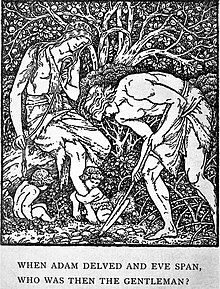 Artwork from the original 1888 edition. | |
| Author | William Morris |
|---|---|
| Illustrator | Edward Burne-Jones (frontispiece) |
| Language | English |
| Genre | Historical fantasy Science fiction Time travel |
| Published | 1888 |
| Publication place | United Kingdom |
| Media type | Print (Hardcover & Paperback) & E-book |
| Pages | c. 300 pp (may change depending on the publisher and the size of the text) |
A Dream of John Ball (1888) is a novel by English author William Morris about the Great Revolt of 1381, conventionally called "the Peasants' Revolt". It features the rebel priest John Ball, who was accused of being a Lollard. He is famed for his question "When Adam delved and Eve span, who was then the gentleman?"[1]
- ^ Froissart, although unsympathetic to the rebels, gives a detailed, albeit imaginary (see Dobson, R.B. The Peasants' Revolt of 1381, (Macmillan, 2nd ed, p. 369)), account of Ball's preaching.
- Et, se venons tout d'un père et d'une mere, Adam et Eve, en quoi poent il dire ne monstrer que il sont mieux signeur que nous, fors parce que il nous font gaaignier et labourer ce que il despendent? Il sont vestu de velours et de camocas fourés de vair et de gris, et nous sommes vesti de povres draps. Il ont les vins, les espisses et les bons pains, et nous avons le soille, le retrait et le paille, et buvons l'aige. Ils ont le sejour et les biaux manoirs, et nous avons le paine et le travail, et le pleue et le vent as camps, et faut que de nous viengne et de nostre labeur ce dont il tiennent les estas.
- If we all spring from a single father and mother, Adam and Eve, how can they claim or prove that they are lords more than us, except by making us produce and grow the wealth which they spend? They are clad in velvet and camlet lined with squirrel and ermine, while we go dressed in coarse cloth. They have the wines, the spices and the good bread: we have the rye, the husks and the straw, and we drink water. They have shelter and ease in their fine manors, and we have hardship and toil, the wind and the rain in the fields. And from us must come, from our labour, the things which keep them in luxury
- Et, se venons tout d'un père et d'une mere, Adam et Eve, en quoi poent il dire ne monstrer que il sont mieux signeur que nous, fors parce que il nous font gaaignier et labourer ce que il despendent? Il sont vestu de velours et de camocas fourés de vair et de gris, et nous sommes vesti de povres draps. Il ont les vins, les espisses et les bons pains, et nous avons le soille, le retrait et le paille, et buvons l'aige. Ils ont le sejour et les biaux manoirs, et nous avons le paine et le travail, et le pleue et le vent as camps, et faut que de nous viengne et de nostre labeur ce dont il tiennent les estas.